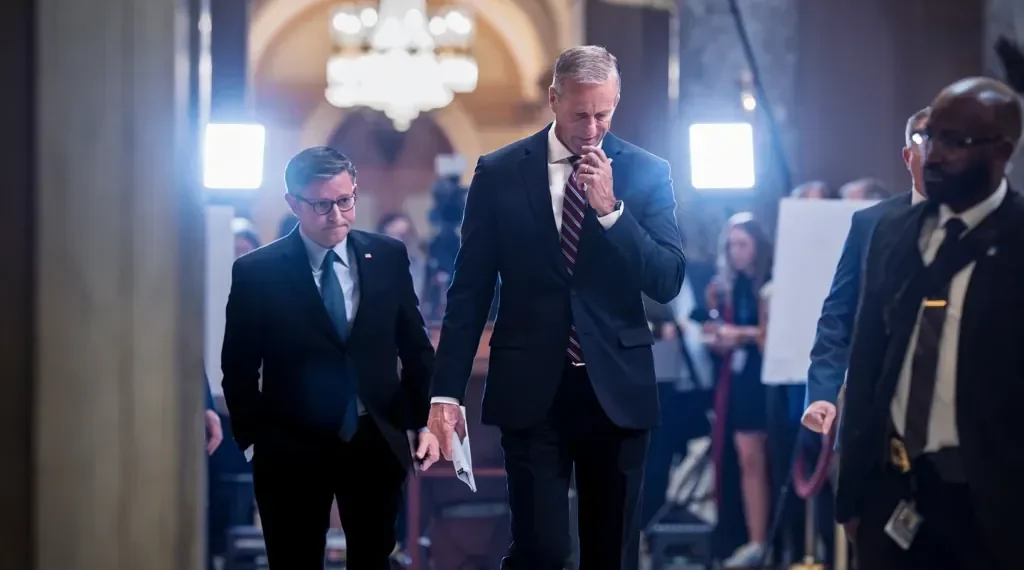Senate funding vote fails again as U.S. government shutdown enters third day with no resolution in sight
Published: October 4, 2025, 14:00 EDT
Summary
A third day of the U.S. government shutdown ended with another failed Senate vote on funding legislation, leaving federal workers and the wider economy in limbo. With Democrats demanding healthcare subsidies and Republicans refusing to negotiate before reopening, prospects for a swift resolution appear increasingly unlikely.
Senate Deadlock Extends Shutdown
The Senate failed once again on Friday to advance a Republican-backed bill aimed at reopening the federal government, as negotiations between Democrats and Republicans remained at a standstill. The measure, which required 60 votes to overcome a filibuster, fell short with a 54–44 tally.
This latest defeat further signaled that Congress is preparing for a prolonged standoff. Senators quickly departed Washington for the weekend, with little optimism for rapid progress. Meanwhile, House Speaker Mike Johnson announced that the House would suspend legislative activity next week, effectively pressuring the Senate to act on the funding bill already passed by Republicans.
Party Lines Harden in the Senate
The vote reflected entrenched divisions on Capitol Hill. Three members of the Democratic caucus—Senators Catherine Cortez Masto, John Fetterman, and Angus King—again sided with Republicans, while Senator Rand Paul of Kentucky remained the sole Republican to oppose the bill.
“They thought they could bludgeon us and threaten us and scare us. It ain’t working,” said Senate Majority Leader Chuck Schumer, underscoring Democrats’ unified resistance.
Republicans argue the government must reopen first, while Democrats are holding out for an extension of health care subsidies that were expanded during the COVID-19 pandemic under the Affordable Care Act (ACA).
Healthcare Subsidies at the Center of the Standoff
Democrats are insisting on preserving enhanced ACA tax credits to prevent steep hikes in premiums, deductibles, and co-pays for millions of Americans. House Democratic Leader Hakeem Jeffries warned that without the subsidies, families would face “dramatically increased premiums, co-pays and deductibles because of the Republican health care crisis.”
Republicans, however, are resisting any policy commitments until government operations resume. Their strategy is to push Democrats into accepting a stopgap bill that keeps spending levels largely unchanged.
Trump Administration’s Shutdown Strategy
President Donald Trump has framed the shutdown as an “unprecedented opportunity” to reshape federal agencies. Instead of furloughs, he has suggested implementing direct layoffs and deeper cuts.
In a social media video released Thursday night, Trump portrayed White House budget director Russ Vought as a “grim reaper” of federal spending. Vought has already halted billions in infrastructure funding for states represented by Democratic senators and announced an additional $2.1 billion freeze for a rail expansion project in Chicago.
Democrats have dismissed these tactics as political threats. “The cruelty that they might unleash on everyday Americans using the pretense of a shutdown is only going to backfire,” Jeffries told reporters.
Economic Ripple Effects Mount
According to the nonpartisan Congressional Budget Office, roughly 750,000 federal employees face furloughs, with an estimated $400 million in wages lost per day until the government reopens. This decline in disposable income could further strain consumer spending and ripple through the broader economy.
Military families have already reported seeking food assistance due to missed paychecks, according to White House Press Secretary Karoline Leavitt, who described the situation as “real pain being endured by real people.”
Speaker Johnson, however, placed blame on Democrats: “All around the country right now, real pain is being endured by real people because the Democrats have decided to play politics.”
Senators Explore Possible Compromise
Despite the partisan standoff, some bipartisan discussions are underway. Senator Mike Rounds, a Republican from South Dakota, floated a compromise that would temporarily extend the enhanced ACA subsidies for one year before gradually phasing them out.
Senator John Thune acknowledged these behind-the-scenes talks, noting that “the more productive conversations are happening outside of the leader’s office at the moment.”
While several Republicans have expressed support for keeping the subsidies—particularly those representing rural states where many rely on marketplace health insurance—it remains unclear whether such a compromise could pass both chambers or gain approval from the White House.
Schumer expressed cautious openness to the informal talks but said Democrats were disappointed with Republican offers so far. “You need Trump to get it done,” he remarked on the Senate floor.
Outlook: Prolonged Shutdown Likely
As senators leave Washington with no votes scheduled over the weekend, hopes for a quick resolution have dimmed. With Democrats unwilling to back down on healthcare subsidies and Republicans holding firm on reopening government without concessions, both sides appear locked in for an extended battle.
For federal employees and millions of Americans dependent on government services, the coming weeks may bring more uncertainty and mounting economic strain.
This article was rewritten by JournosNews.com based on verified reporting from trusted sources. The content has been independently reviewed, fact-checked, and edited for accuracy, neutrality, tone, and global readability in accordance with Google News and AdSense standards.
All opinions, quotes, or statements from contributors, experts, or sourced organizations do not necessarily reflect the views of JournosNews.com. JournosNews.com maintains full editorial independence from any external funders, sponsors, or organizations.
Stay informed with JournosNews.com — your trusted source for verified global reporting and in-depth analysis. Follow us on Google News, BlueSky, and X for real-time updates.














